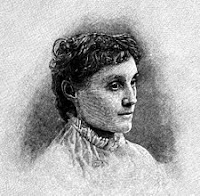THE MUSES
by Ethel Maude Colson
Of old the Muses sat on high,
And heard and judged the songs of men;
On one they smiled, who loitered by;
Of toiling ten, they slighted ten.
They lightly serve who serve us best,
Nor know they how the task was done ;
We Muses love a soul at rest,
But violence and toil we shun.
If men say true, the Muses now
Have changed their ancient habitude,
And would be served with knitted brow,
And stress and toil each day renewed.
So each one with the other vies,
Of those who weave romance or song:
On us, O Muse, bestow thy prize,
For we have striven well and long!
And yet methinks I hear the hest
Come murmuring down from Helicon:
They lightly serve who serve us best,
Nor know they how the task was done!
— Edith M. Thomas
Buy Ethel Maude Colson Books at Amazon
About the Author
Edith Matilda Thomas (August 12, 1854 – September 13, 1925) was an American poet who "was one of the first poets to capture successfully the excitement of the modern city." Wikipedia


No comments:
Post a Comment